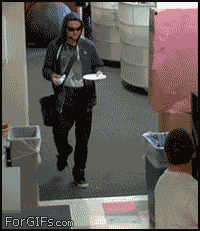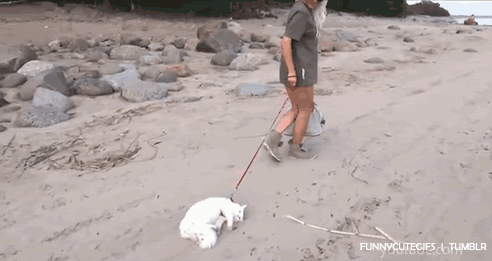Boring methodical stuff
(Skip down for funny, non-methodical stuff)
When I started medical school more than six months ago, I was full of expectations. I expected to study a lot. I expected to stare at MRIs and radiographs and CTs and ultrasounds for inordinate amounts of time. I expected to memorize long lists of viruses and bacteria and protozoa. I expected to learn all the nerves and muscles and veins and arteries in the human body. And I expected that, after all this work, I would become a successful physician.
The last thing I expected, though, was failure.
For me (and most of my slightly OCD classmates) failure at anything is not an option. You can chalk that up to my upbringing or genetics or societal pressure or whatever. I'm not sure why I am the way I am and, honestly, I'm not sure it matters. The longer I'm in medical school, the more I am compelled to believe that failure is a very necessary pill for a medical student to swallow. I don't always get good grades on my exams. I don't always get through all the material I need to get through. I don't always feel confident in my ability to apply medical principles to clinical situations. And that's the way it's supposed to be. Failure is the antidote to pride. It's the vaccination against apathy. It's the prescription that increases desire to learn. It's the drug that deepens resolve to do better next time.
Don't believe me? Sit down, kids. Grandpa's about to tell you a story.
One of my heroes is Russel M. Nelson. For those of you who don't know him, he is a Mormon Apostle (Yes, Apostle, like in the Bible. Click here for an explanation.) and world-renowned surgeon. Here's a picture of him.
I've always known him as the man who pioneered open heart surgery, served as the president of various surgical organizations, and won countless awards for his contributions to the medical community. To an aspiring doctor like myself, he's nothing short of a super hero. What I didn't realize though, is that all the success he has seen in his surgical career can be traced back to a pivotal moment of failure. In his words:
"Those
first days of open-heart surgery were, “like sailing an
uncharted sea,” with moments of euphoria but with despair as well, when
surgery was unable to save a life. Brother Nelson describes one such
instance early in his career: “In 1957, a couple brought their third child to me for repair of congenital heart disease. Their
first child had died from congenital heart disease before the advent of
cardiac surgery, and their second also died after an unsuccessful
open-heart operation that I performed. I operated on the third child,
but she died later that night."
“My
grief was beyond expression. When I went home, I told the story to
Dantzel (his wife) and said, ‘I’m through. I’ll never do another heart operation as
long as I live!’ I wept most of the night. All I could think of were
the faces of those two parents, and I could still see those pathetic
children in my mind, blue-lipped and with clubbed fingers, yet with
smiles of confidence and hope. I determined that my inadequacies would
never be inflicted on another human family."
“When
morning came, Dantzel finally said, ‘Isn’t it better to keep trying
than to quit now and require others to go through the same grief of
learning what you already know?’ I listened to her counsel. I returned to the laboratory to work a little harder, learn a little more, and strive further.”
So there! Failure is not only important. It's 100% necessary. The key is not to avoid it but to grow from it! Don't be afraid to fail! Have the courage to get back on the horse and get better!
I'll end with a quote from J.K. Rowling's 2011 Harvard commencement speech:
“Some failure in life is inevitable. It is impossible to
live without failing at something, unless you live so cautiously that you might
as well not have lived at all. Failure taught me things about myself that I
could not have learned any other way. You will never know your strength until
you have been tested by adversity.”
Funny Non-methodical Stuff
- Medical fact du juor: In an emergency, coconut water can be used as IV fluid. It has roughly the same ionic concentration as blood. Don't ask me why this is useful information. Ask this guy:
- I was called on to answer a difficult question a few days ago in class. The question had various transverse cuts of the spinal cord that looked like this:
- The question had to do with the locations of the cuts in the spinal cord (aka "Is this cut from the thoracic or cervical or lumbar region?). In nothing short of a miracle, I correctly matched all of the cuts with their proper locations. My triumphant moment was cut short, however, by the professor asking me to justify my answer. Uh. Um. Hmmm. Yeah, that was asking too much. I mumbled something to the effect of "I am, unfortunately, unable to justify my answer," at which, everyone in my class laughed. With me? At me? Still not sure. haha
- I got ahead in my studying last week and decided to take a road trip up to DC with my friend, Lauren, this weekend. That's right! You can still have fun as a medical student! It was magical. I got to wander around the National Institute of Art (the Impressionists were my favorite, but there was some bizarro modern art that was pretty cool as well), try a tiramisu shake at a drive-thru ice cream place aptly named the "MooThru," be evacuated from the National Aquarium (no idea why), taste my first frozen hot chocolate in Georgetown, dance my socks off while playing "Just Dance," and, best of all, I got to see a lot of my best friends. Shoutout to Jason, Lanae, Paris, Catherine, Trevor, Jessi, and Ella for making my visit absolutely incredible! Here are a few pictures from the occasion.
- I have my final musculoskeletal/integument exam this coming weekend. Hopefully, afterwards I feel like this:
- And not like this:
- To be honest, though, thinking about studying all day every day this week makes me feel like this:











No comments:
Post a Comment